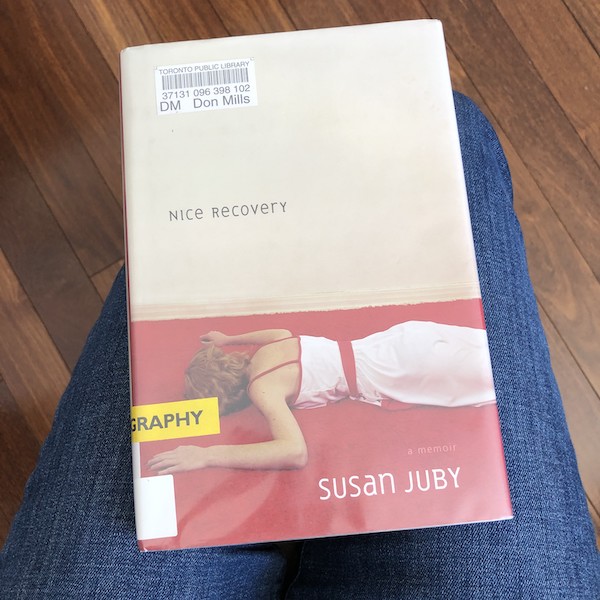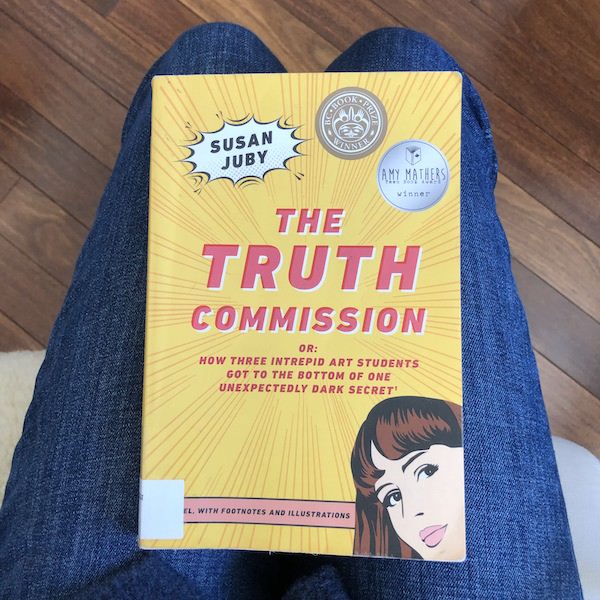Canadian YA author Susan Juby is dominating my reading life
I think I’m addicted
Since discovering Juby’s 2003 breakout YA novel Alice, I Think in a Little Free Library a few weeks ago, I’ve now made good use of the Toronto Public Library’s Holds system to read seven of Juby’s print books and listen to one audio book.
That’s right! Eight books in just over a month.
I’ve been whipping through print books in the YA category because they’re shorter than adult books, and easier to read. They’re also very much like the stories one finds on Netflix. But they’re actually good for your brain. In other words, YA novels are a healthier substitute for Netflix, and that’s honestly where I’m at.
Most of Juby’s 12 published books are aimed at teens, but she also has a recovery memoir and two delightful adult novels. They all have similar themes and flavours, and they’re all good. Don’t you love it when you discover an amazing author who has a deep backlist?! Delicious.
Here are three of my favourite Susan Juby books so far. (Woohoo! I still have three more YA novels to read! And she has a couple of books upcoming.)
Nice Recovery, memoir, 2010
The Truth Commission, YA fiction, 2015
The Fashion Committee, YA fiction, 2018
Nice Recovery is a wonderful memoir. Juby spends the first part of her book looking back at her teenage years and subsequent recovery from alcohol addiction in her early 20s. She grew up in the 1970s and ’80s in the small northern town of Smithers, BC, and became addicted in high school.
Somehow she stumbled through, and also managed to own and ride a show horse. She couldn’t keep it up as her addiction deepened. She was depressed, experiencing bullying, and not doing too well in school. But a teacher recognized her need to choose what she would work on, and she used her school time to pursue an interest in the history of women’s clothing. Meanwhile, she wore some attention-getting outfits, which she thrifted on a small budget at various stores in the surrounding towns.
It was an analog time: ’90s Toronto
Later, Juby moved to Toronto as an aspiring fashion student living downtown in a student co-op. But she couldn’t stick with school. Juby recounts the days when she managed a record store, manned the cash in a knitting shop, and frequently partied herself into a blackout state. As evidenced by the record store, it was a different time, and the backdrop of ‘90s Toronto will appeal to nostalgic Gen X readers like me.
Juby, a mature person when she wrote this in 2010, points put that addiction was different back then. These days, younger addicts are more common. And they now have multiple addictions, not just one. Kids today live in a different world, but at least they have more options for getting help with substance abuse.
At about the 2/3 mark, Nice Recovery turns into gentle journalism about what it’s like for young people recovering from addictions in the digital age. Juby interviews young people in recovery about what worked for them, what different treatment programs look like, and what supported them as they tried to find a new way.
As a memoir, this book is brilliantly written. The author begins by noting that she’s not a reliable narrator of what happened during her addicted years. Yet, somehow she manages to construct a vivid picture from blurry memories, and you can hear her voice so clearly. There are laughs along the way, like about the outfits she used to wear to bush parties.
Maybe it’s because Susan Juby and I are exactly the same age. Or maybe it’s the small-town setting. As a small towner who thought herself stylish, even at a bush party, I could totally relate to her story. There was no such thing as a YouTube makeup tutorial back then, and mistakes were made.
But some things are universal. Juby’s story reveals how people use things like drugs and clothes to develop pathways to friendship.
On the surface, her books are about finding friends and discovering fashion, but Juby goes deep. She reveals there’s loneliness at the heart of it all. She shows how our ways of coping with loneliness can lead us down a road, and she asks: What road do you want to travel?
Very real, but also somehow funny
As in her memoir, Juby’s YA novels portray addicted and recovering people with compassion. But in her fiction stories, addiction is more a part of the setting than the plot. That means it shows up in minor characters. In some books, the addicted character is a kid. In others, it’s a parent. Addiction is simply part of the world the characters live in. Like, hello modern reality.
The Truth Commission and The Fashion Committee are a pair of loosely connected novels that take place at the same idyllic art school in Nanaimo, BC. But different characters are at the heart of the drama.
In The Fashion Committee, which happens in the modern day, the charming main character Charlie has a parent in recovery. It’s a compassionate look at what that might be like for a young person. And also, the story reveals how young people often use clothes to say something. Things they cannot say in words.
The Truth Commission is another modern story told in the voice of a young writer who explores the consequences of telling the truth in print. It’s an entertaining examination of a main character named Normandy who learns that good writers must be brave enough to face the truth, even in the face of serious consequences.
It seems to me that Juby’s point, throughout the books I’ve read so far, is that clear-eyed honesty makes a profound difference. It matters in your personal relationships and in your communities. Truth telling makes you trustworthy, someone to listen to, someone to take seriously.
Truth makes you someone to stand beside. Like, let’s say, at a protest in Ottawa. Truth matters!



Published by